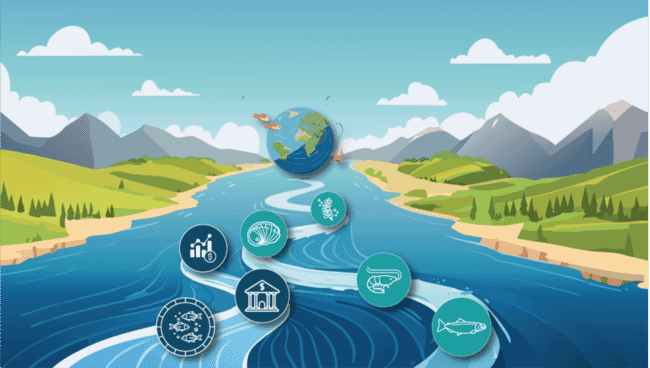
© ASC
Speaking after recent global forums on ocean finance and sustainability, Ray Dhirani, ASC’s head of capital markets outreach, emphasised the role of certification in helping investors identify environmentally and socially responsible aquaculture operations.
Seafood lovers may not always consider what lies behind the shrimp, salmon or tilapia on their plate – but a growing movement is working to make seafood farming more responsible and future-proof. Increasingly, investors are taking notice.
Dhirani shared insights from recent events like the United Nations Ocean Conference (UNOC) and the Blue Economy & Finance Forum (BEFF) – he sees both challenges and cause for optimism. While some headline commitments may have fallen short, innovative financial models and partnerships – especially in developing regions – point to new opportunities.
Ocean investment still lagging behind
At the recent UNOC in Nice, France, global leaders pledged around $10 billion of new capital toward ocean protection. While it appears significant, it falls short of the estimated $175 billion that is needed every year to protect marine ecosystems and support sustainable development.
So why isn’t more capital flowing into the sector?
“Investors want to fund sustainable ocean projects. But they need clear rules and trusted standards to de-risk those decisions,” said Dhirani in a press release.
Without strong regulation and credible data, private finance hesitates. As Oliver Withers, head of nature at Standard Chartered, put it, the high seas are difficult to govern and protect due to their lack of national ownership.
Investors looking to seafood for impact
Just as consumers look for eco-labels on seafood, investors are seeking signals that aquaculture businesses take sustainability seriously. Certifications such as ASC can provide that assurance.
“Frameworks like ASC help investors know a seafood business is serious about sustainability,” Dhirani explained.
The ASC label tells investors and consumers that a farm is meets environmental and social standards. For institutional investors, such certification is a key part of risk assessment. According to Dhirani, ASC is also being recognised within global frameworks like the Taskforce on Nature-related Financial Disclosures (TNFD), helping investors evaluate social and environmental risks in global aquaculture portfolios.
“The breadth of the ASC standard is helpful for investors who are looking to cover social as well as environmental indicators. ASC being a global standard has also proven useful to investors with large global portfolios,” said Dhirani.
Financial risks of ignoring sustainability
As environmental regulation tighten across markets, seafood farming operations that fail to embed sustainability are exposing themselves to financial risks. Not only do they risk falling foul of emerging regulations, but they may also find themselves excluded from capital flows increasingly tied to verified environmental and social impact.
Sustainability is a key driver of ‘licence to operate’ for companies in seafood farming. Business models are more likely to be resilient to shocks if sustainability is built in from the outset.
“The regulatory picture is changing rapidly, and financiers will be looking increasingly for verified impact aligned to the latest science. For longer term investors, aligning to this regulatory framework will be key. From a market standpoint, aligning to the ASC standard increases resilience for investors and reduces sustainability risks.
“It also helps to evidence the claims that the finance sector is making around impact. Additionally, ASC holds unique data points to evidence positive impact – both on social as well as environmental areas,” explained Dhirani.

© ASC
Pathways to improvement
For farms not yet ASC certified, there are still pathways to demonstrate progress towards sustainability through the Improver Programme by ASC.
“Impact investors recognise that some farms are not yet ready for certification; however, if they can engage with the Improver Programme and credibly demonstrate their path toward sustainability in aquaculture. As a result, then they may be able to fit some investor’s impact criteria,” said Dhirani.
As the financial sector accelerates its shift toward nature-positive and climate-aligned investing, tools like the ASC certification are emerging as vital links between sustainability and finance. Whether through full certification or participation in improvement programmes, aquaculture businesses have a clear opportunity to align with the future of responsible investment.
“There’s still a long way to go, but on the bright side, during UNOC and BEFF we saw innovation from some leading financiers – including some new blended financial models utilised in developing countries,” Dhirani concluded.


